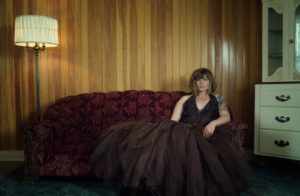Since finishing studying cello in the music diploma program at the Victoria Conservatory of Music—a partner of Camosun—in 2011, Naomi Kavka has travelled everywhere from Japan to Prince George to record music. But Kavka—who recently completed studies in musicology at Memorial University of Newfoundland in St. John’s—has overcome dark times in her life, and at one point she was ready to quit music. Kavka was playing cello in Prince George with the local symphony when she came close to selling her cello and “becoming a hunting guide,” she says.
“It’s difficult to put my finger on,” says Kavka, thinking back on those times, “but I think I was trying to find meaning in the wrong places, and find fulfillment in the wrong places. I think I really had to crash and burn. It took me to a very dark place, and it took that processing of it to facilitate making this album and realize what I really want to focus on in my career.”

She made it through and just released Slammed Doors and Severance, her first full-length album. Much of Kavka’s alternative folk/country/indie sound actually comes from a love for ’70s rock, such as The Rolling Stones, she says. Kavka’s 2016 EP Hay Fever, recorded in Japan at a studio that only records on cassette, had minimal arrangements; it took Kavka a while to find the right group of people so that she could perform the songs as she envisioned them.
“With Slammed Doors and Severance, I wanted to just have a huge sound with a lot of instrumentalists and not feel held back at all in terms of the arrangements, even though it’s still just a standard rock band kind of set up,” says Kavka, citing The Stones’ Exile on Main St. as an example of the sound she was aiming for. “I was kind of shooting for that in terms of having the live sound with a lot of instrumentalists playing off of each other.”
Kavka (who was also a Nexus staff photographer during her time at Camosun) says her formal education in St. John’s helped cultivate her creativity and ability as a musician, which she says stands contrary to what many creative people often believe about education.
“A lot of people think formal training takes away from creativity, and my formal training actually just gave me a lot more tools in terms of thinking about music and how I can communicate ideas with people, and how I can conceptualize things in a bigger scope,” she says.
Kavka adds that every musician, in their own way, rationalizes music to some extent.
“Doing formal training, for me, just gave me a different sort of framework, a way of doing it,” she says. “I kind of view it as a trade school.”
Kavka says it not only helped her learn to play better but also helped her to grasp what she calls “the architecture of music.” She says one of her favourite experiences in school was playing chamber music, because it taught her the meaning and value of communication from a musical standpoint.
“Not just in being able to talk about music, but the way you communicate through your playing and through visual cues, and your body language, the way you phrase things to help communicate with other people you’re performing with,” she says.
Kavka says that communication was an important element in making sure the recording process for her album went well.
“Most of the instrument tracks were done live at the same time in the same room, so I was playing with the bass player and the drummer. We were doing live tracking for all the rhythm tracks,” she says. “Our ability to communicate with one another and insinuate changes in time, I don’t think it would have been possible in the same way. I wouldn’t have had the confidence to know how to communicate those changes to these musicians. It’s sort of like, I used to be able to swing a hammer, but now I can build a house.”
